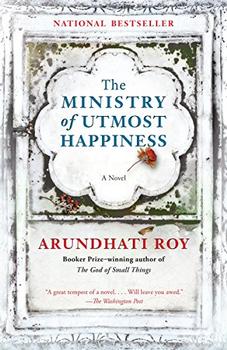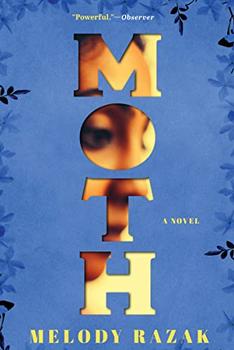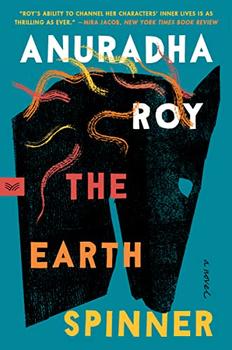Summary | Excerpt | Reading Guide | Reviews | Beyond the book | Read-Alikes | Genres & Themes | Author Bio

If the concept of a call center in Bangalore no longer rings unfamiliar, you can credit the Indian economic policies of the '90s when the country revamped its clanking, socialist-leaning bureaucracy and opened the floodgates of monetary liberalization. It probably goes without saying that the exploding economy did not benefit all Indians equally — the rural poor, and those entrenched by decades of stagnant mobility, were largely deprived a piece of the economic pie. Anjum, a trans woman, the protagonist who galvanizes the first half of Arundhati Roy's sophomore novel, The Ministry of Utmost Happiness, is one such unfortunate whom the country's newfound prosperity largely passes over. Anjum is born Aftab, with both male and female parts, until surgery makes her who she wants to be: a woman. She thus joins India's fringe but vibrant community of "Hijras."
Anjum and a band of other misfits — including a low-caste Hindu who attempts reinvention by renaming himself Saddam Hussein — take up residence in a New Delhi graveyard in a small hovel called Khwabgah, which translates to, not without a touch of irony, House of Dreams. And dreams just might be all that this group of unlikely friends has: "Once you have fallen off the edge, you will never stop falling," Anjum points out. "We aren't really real. We don't exist."
Such invisibility has a small set of advantages. Anjum and her fellow residents of Khwabgah are direct witness to a whole list of historical events that have unfolded in India's recent history, a few, quite literally, in their backyard. Now might be as good a time as any to mention that while a large segment of the literary world has been waiting with bated breath for Roy's second novel after the mesmerizing, Booker Prize-winning The God of Small Things, Roy has been deeply immersed in political and social activism in India. Among many other causes she is devoted to, Roy has been sounding the alarm bells about India's rising right-wing Hindu nationalism, and is a fervent supporter of the cause of Kashmir's independence (see Beyond the Book). While she has written many works of nonfiction that have relayed her views, it was inevitable that her political fervor would make its way into the pages of this novel.
In fact, there are times when Roy's characters come across as little more than convenient canvases on which to peg the political narrative and flashpoints of the last twenty years — whether it be the Gujarat riots of the '90s (see Beyond the Book for The Association of Small Bombs) to the rising strain of Hindu nationalism. Even less obscure events, such as a fast by a Gandhian activist, Anna Hazare, that riveted India's attention in 2011, feature in Ministry.
While Anjum makes for an entertaining protagonist, she occasionally buckles under the weight of her storytelling burdens. It takes Tilo, a pro-independence Kashmir activist from the southern Indian state of Kerala (a woman who sounds much like Roy herself), to really bring back some of the magic from The God of Small Things. Tilo, whose story takes up much of the second half of Ministry, used to travel often to the troubled state mostly because her lover, Musa, was a fervent devotee of the pro-independence cause. She, too, was witness to the unimaginable atrocities that played out daily. "They had been a strange country together for a while, an island republic that had seceded from the rest of the world," Roy writes of the couple. This segment, set in Kashmir, is where Roy really hits her stride. The prose is spellbinding, and the characters and historical events are woven together much more seamlessly.
The Ministry of Utmost Happiness is a welcome addition to Roy's fiction, even if it sometimes staggers under the yoke of its hefty political ambitions. Readers who don't know the subcontinent's history needn't worry, Roy's prose is eloquent enough to paper over unfamiliar territory, even if the novel does sag in the middle as she tries to find her footing and corral the disparate story threads into a cohesive whole.
Ultimately, ardent fans won't be disappointed, although they might grumble that twenty years was much too long of a wait. This exploration of history's everyday machinations might be unruly at times but it's also visceral, passionate and, at the best of times, entirely dazzling. "History would be a revelation of the future as much as it was a study of the past," Roy writes. This could well stand in as a succinct explanation for the story. As recent world events have shown, history has been repeating itself with alarming regularity all over the world. Why should India be any different?
![]() This review was originally published in The BookBrowse Review in July 2017, and has been updated for the
May 2018 edition.
Click here to go to this issue.
This review was originally published in The BookBrowse Review in July 2017, and has been updated for the
May 2018 edition.
Click here to go to this issue.

If you liked The Ministry of Utmost Happiness, try these:

by Melody Razak
Published 2023
Melody Razak makes her literary debut with this internationally-acclaimed saga of one Indian family's trials through the tumultuous partition - the 1947 split of Pakistan from India - exploring its impact on women, what it means to be "othered" in one's own society, and the redemptive power of family.

by Anuradha Roy
Published 2023
From the critically acclaimed, Booker Prize-nominated author of Sleeping on Jupiter and All the Lives We Never Lived, an incisive and moving novel about the struggle for creative achievement in a world consumed by growing fanaticism and political upheaval.
Your guide toexceptional books
BookBrowse seeks out and recommends the best in contemporary fiction and nonfiction—books that not only engage and entertain but also deepen our understanding of ourselves and the world around us.